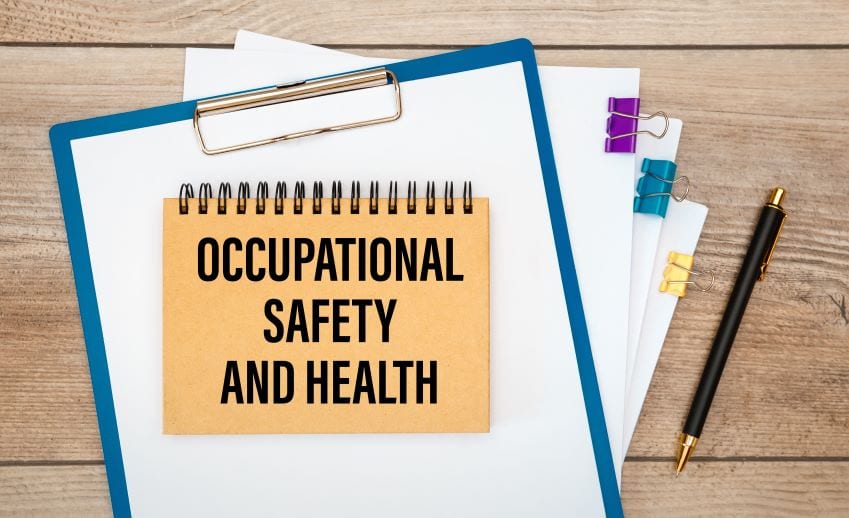
Regulations that were added to the Safety and Health At Work Act have been approved by Cabinet and will soon come into force.
This was alluded to by Minister of Labour, Social Security and Third Sector, Colin Jordan, as he provided a synopsis of what transpired during Thursday’s Cabinet meeting, at a post-Cabinet press conference today.
Pointing out that the Safety and Health At Work Act was a piece of legislation that had been in force for quite a number of years, Minister Jordan said: “But when we came into office, we recognised that there were no regulations. And those who are familiar with legislation and regulations, appreciate the fact that often, legislation cannot be properly implemented, if there are not the additional details that are found in the regulations.”
He noted that the regulations were established last year and they relate to drinking water, general duties, noise, personal protective equipment and sanitary conveniences.
In addressing the aspect of sanitary conveniences, Minister Jordan stressed: “We held fast to a promise that we made that particularly the women folk of our country would not have to suffer the indignity when they are earning a living to support their families, of having to use the bush to relieve themselves. So, that was sanitary conveniences. Washing facilities was another one; workstations was another one, and … medical supervision was another promise that we made before coming to office.”
He stated that there was now a regulation in place for persons who work at petrol stations. It speaks to their terms of work provision that include rain protection and also tests, such as medical tests, that are provided without any cost to them.
Mr. Jordan also said that a significant part of the Safety and Health at Work Act speaks to the right to refuse dangerous tasks. Stressing that this had been the bone of contention for quite some time, he said: “There is a level of vagueness, because a piece of legislation cannot go into minute detail. And so, that has caused challenges, both for workers and their representative unions, as well as employers.”
“Imminent danger means a situation where conditions or practices in a workplace present a danger, which could reasonably be expected to cause immediate serious physical harm, a serious health hazard and occupational disease or death. So, we have here a definition that gives some detail, but we go further to specify what we mean for example, by serious physical harm…. Serious physical harm means severe damage to a part of the body, whether or not reversible to the extent that incapacity could result.”
Labour Minister Colin Jordan speaking on the regulation related to the right to refuse dangerous tasks
He said the reason why it was not addressed with the others, last year, was because when they were preparing it, it was recognised that the Safety and Health At Work Act did not allow the Minister to make this particular regulation, even though it is probably the largest bone of contention in the entire Act.
Elaborating, he stated: “So, we first had to get permission from Cabinet. And, we had to go to Parliament, because we were amending the legislation, and Parliament agreed that they would allow the Minister responsible for Labour to make the regulation and thereafter the Chief Parliamentary Counsel worked on the regulation.
The Labour Minister, while noting the regulation related to the right to refuse dangerous tasks defines some critical concepts, pointed out that one such term was “imminent danger”.
He said: “Imminent danger means a situation where conditions or practices in a workplace present a danger, which could reasonably be expected to cause immediate serious physical harm, a serious health hazard and occupational disease or death. So, we have here a definition that gives some detail, but we go further to specify what we mean for example, by serious physical harm…. Serious physical harm means severe damage to a part of the body, whether or not reversible to the extent that incapacity could result.

“So we are giving some form to concepts that would allow for a proper application of this part of the Safety and Health At Work Act in the workplace because the workplace is where these things become issues, not in Parliament and not in Cabinet.”
Minister Jordan also pointed out that the regulation speaks to the fact that the right to refuse dangerous tasks has certain exemptions. In outlining some instances, he said: “… A police officer, for example, could not say I am not doing that, because somebody may throw a rock at me, … and that will cause me danger…. If you work in a hospital, or clinic, any facility providing health care; if you’re looking after the elderly; if you’re looking after children, there are certain scenarios, situations where you have to put yourself in harm’s way to protect those who are very much less able to do it for themselves.
“And, facilities for persons with disabilities, and this is a critical one. You are aware of Government’s focus on improving the lives of persons with disabilities. And so, one of the exemptions to the right to refuse dangerous tasks is if the person is involved in the operation of a facility for persons with disabilities.”
He noted too that the regulation outlines the complaint process, timeframes for investigation and who is to be involved in the investigation.
According to him, it also addresses how the investigations have to begin immediately on reports, and if it is not settled at what is called the domestic level, the company level, the business level or the organisation level, then it can go to the Chief Labour Officer, who within two working days starts the process.
The Labour Minister added that once the investigation was complete, an oral report must be given and a written report must follow within two weeks, so that there is closure to the situation.
